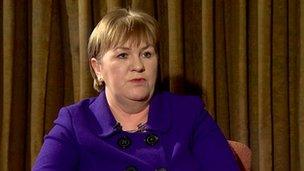Johann Lamont raises questions over free tuition policy
- Published

Johann Lamont became Scottish leader a year ago
Scottish Labour leader Johann Lamont has warned that publicly-funded higher education was "not viable" without a "serious" reduction in standards.
Ms Lamont's remarks came in a speech to mark her first anniversary as leader.
She called for "a long-term solution" to higher education funding in Scotland.
Ms Lamont also claimed the Scottish government's free tuition fees policy had not increased the number of low income students going to university.
The MSP said that if the approach to funding did not change then Scottish universities would begin to "lose ground" against their international competitors.
During her address at the Mitchell Library in Glasgow, Ms Lamont said: "In spite of relatively low differences in learning outcomes between Scottish schools, an achievement gap between rich and poor continues to persist in Scotland.
"The educational divide between rich and poor is a scar on the country - it is simply unacceptable."
She insisted the education system in Scotland was "not delivering for the poorest".
It is not the first time Ms Lamont has put the spotlight on Scotland's free tuition policy.
At the end of September she told a party gathering that it was time to end a "something for nothing" culture.
She went on to question universal benefits, which see rich people receiving tuition fees and prescriptions for free.
A week later, when Ms Lamont came before her party's UK conference in Manchester, she renewed her attack on the universal provision of some benefits.
At the time she accused the SNP of making the poor pay for "election bribes" that benefit the better off.
No-charge system
In this latest speech, Ms Lamont questioned whether current higher education funding arrangements were fair.
She pointed out graduates not only got "higher lifetime returns", but a "disproportionate number" also come from more privileged backgrounds.
She added: "These two points, taken together, mean that a no-charge system is essentially regressive.
"There is no such thing as free higher education - under a completely tax funded tuition system, everybody is forced to pay for it, including those on low incomes."
The party leader called for different and innovative approaches to learning to close the educational gap between rich and poor.
She suggested targeted support, nurture classes, mentoring, summer schools, supported study and access to extra tuition.
Ms Lamont said she wanted to set out a vision of Scottish education which would take more than one term to deliver, one that she could start, "but may not be able to finish".
The former teacher added: "We will need to take tough choices and we will.
"Is £75m a year to European students a price worth paying to keep a no-tuition fee policy for Scottish students while our colleges are under attack? And service to the vulnerable?
"Are reductions in classroom support, including teachers, a price worth paying for a freeze in the council tax?
"Our aim? That in 20 years' time Scottish politicians aren't going round the world to see how it is done there, but so that the rest of the world comes here to see how we do it."
Ms Lamont was elected leader a year ago, beating off competition from Eastwood MSP Ken Macintosh and Glasgow South MP Tom Harris.
Commenting on the speech, Scotland's Education Secretary Michael Russell said Ms Lamont had shown her true colours and they were "Tory blue".
He added: "There is barely a scintilla of difference between her plan to abolish free education and the disastrous fees regime introduced by the Tories south of the border.
"Figures out just last week showed a drop of more than 6.3% in the number of people accepted to English universities. Scottish universities, in contrast, were up almost 2%.
"If Johann Lamont had her way more than 3,300 students accepted to university this year would not have gone. That is the reality of what Labour are now proposing. Thousands of students denied the opportunity to go to university."
Robin Parker, president of NUS Scotland, said he agreed that there should be a focus on educational opportunities for people from the most deprived backgrounds, but he insisted tuition fees were "not the way to help".
He added: "Now is the time for the whole Scottish Parliament to work together on protecting colleges and protecting college students."
- Published3 October 2012
- Published17 December 2011